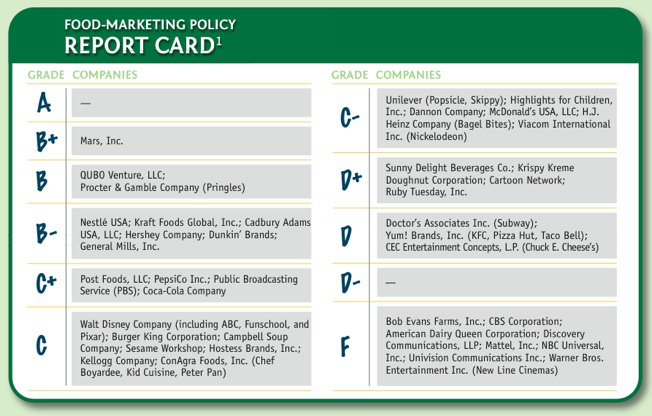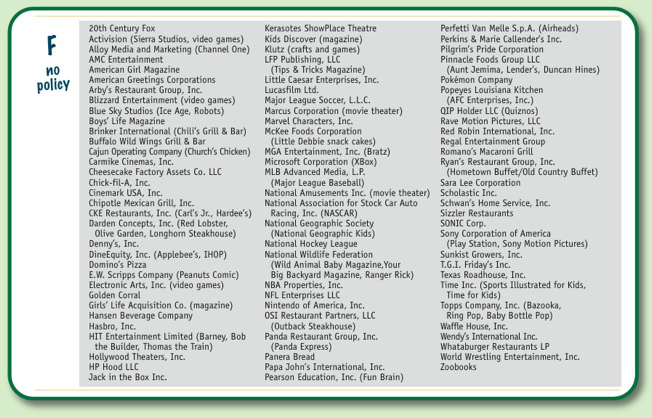Food & Entertainment Industries Get Failing Grade For Pushing Unhealthy Snacks On Kids
The folks over at the Center for Science in the Public Interest recently took a look at how 128 different food and entertainment companies market food to kids. And, perhaps not surprisingly, they gave failing marks to 95 of them for having either weak policies for marketing food products to children or having none at all.
No companies in the report received an A grade, and the only company receiving a B+ was Mars, Inc., not for their sugary, delicious, yummy snacks that I could eat right now, but because “Mars’ policy excludes marketing to children under 12 and covers most of the key marketing tactics used to reach children.”
The highest rated entertainment company on the list is family-friendly channel Qubo, which received a solid B. Writes CSPI, “Qubo’s policy is comprehensive, applying reasonably good nutrition standards to its full range of programming.”
Among the huge list of companies that failed on CSPI’s report card were:
• Denny’s: “For marketing to children through its children’s menu, which includes many nutritionally poor items; games on its Web site; and a kid’s birthday club.”
• Lucasfilms: “For not having a policy. Presently, Lucasfilms is licensing Star Wars toys as a premium to go with McDonald’s Happy Meals, many of which are nutritionally poor.”
• Topps: The makers of, among other candy products, Baby Bottle Pop was failed because “Over the years Topps has retained the services of the Jonas Brothers and Clique Girlz singing groups to convince children to purchase that infantilizing product, whose 140 calories all come from sugar.”
Reports indicate that advertisers in the U.S. spend about $2 billion annually to market food to children, but the field has been largely self-regulated.
“Despite the industry’s self-regulatory system, the vast majority of food and entertainment companies have no protections in place for children,” said CSPI nutrition policy director Margo G. Wootan in a statement. “If companies were marketing bananas and broccoli, we wouldn’t be concerned. But instead, most of the marketing is for sugary cereals, fast food, snack foods, and candy. And this junk food marketing is a major contributor to childhood obesity.”
While not going so far as to enact federal regulations, the Federal Trade Commission is supposed to meet soon to propose some criteria for marketing foods to children that companies will be expected to adopt voluntarily.
Do you think there’s a problem with the way food products are marketed to children? Is the issue ultimately a parental decision, as they’re the ones who should have the final say on what their children eat?


Most Food & Entertainment Companies Get Failing Grade for Policies on Marketing Food to Children [CSPI]
Want more consumer news? Visit our parent organization, Consumer Reports, for the latest on scams, recalls, and other consumer issues.

